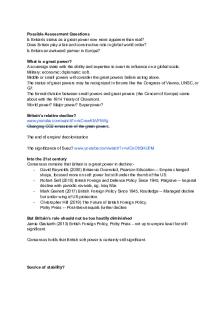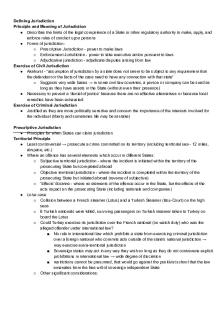1890-1914 7 8 9 - British Empire Notes PDF

| Title | 1890-1914 7 8 9 - British Empire Notes |
|---|---|
| Course | History |
| Institution | University of South Wales |
| Pages | 5 |
| File Size | 47.4 KB |
| File Type | |
| Total Downloads | 68 |
| Total Views | 150 |
Summary
British Empire Notes...
Description
1890-1914 7) Consolidation and expansion of the British Empire in Africa 8) Imperial and Colonial Policy 9) Trade and Commerce
Consolidation and expansion of the British Empire in Africa Post 1890:
If you remove the example of Egypt and South Africa, Britain had been cautious when it came to expansion However, changing attitudes in Britain towards the Empire, had their own effects, especially in Africa In short, the new Conservative government of 1895 continued with Disraeli’s “Party of Empire” philosophy and put Britain’s position in the world high on the agenda
British Policy towards African:
Sparked by Berlin Conference 1884-1885 o Had to provide evidence of “Effective occupation” of African colonies to claim ownership o Pre-1880, charter companies established administration o Post 1885, Empire took official control of most territories 80% under native rule (1884-1885) 10% left by (1904-1905)
The Extension of Expansion:
Chartered companies play a large role - was effectively them that had to supply evidence “effective occupation” (according to the Berlin Treaty) o This allowed formal control to take place later on o So, the Chartered Companies make a claim based on financial/trade opportunities and this offers a pathway to formal occupation The British felt a need to know that their boundaries were secure - it didn’t matter how large or small the threat was If borders were threatened, the British felt they had the right to intervene - using force and ‘ coercion’
British West Africa:
Ashanti Land o Consistent tensions between Ashanti and British o Demanded land be passed to Empire o Anglo-Ashanti War (1896) o Uprising in 1900 led to annexation o Integrated into Gold Coast colony Nigeria o French-Anglo agreement (1890) o Took control and united by 1914 Zanzibar o 1890 Protectorate o Shortest war in history (38 minutes) o British Sultan reinstated for 6 years Kenya o Important route from Indian Ocean to Uganda
o Sheilih - weapons from Germany o Became part of British Protectorate (1895) o British Colony (1920) Uganda o Anglican and French Catholics competing with Zanzibari Muslims o 1886 - King Mwanga tried to assert authority o 1890 signed a treaty with Lord Lugard (BEIC) o British Rule in 1894 o Uganda Railway - formal takeover of East Africa and Uganda Sudan o Mahdist Revolt (1881) o Salisbury wanted to reconquer - security of sea route to India o Concerns of European interests in headwaters of the Nile German and British Treaty British Campaign o Aid Italy o Uphold British Civilisation General Kitchener - commander in chief of Egyptian Army o Won at Omdurman (1898) o Reacquired Sudan o Ordered to Fashoda - Headwaters of the Nile o French expedition - press over exaggerated claims to war 1899 - agreement between British and Egyptians
South Africa: The Treaty of Berlin was the most obvious demonstration yet that other countries were seeking more influence. The defeat in that Transvaal also showed them that they could lose and they must demonstrate strength to succeed and dominate the world - especially in Africa. Britain had lost control and influence over the Transvaal. British Confederation:
The idea of a British led confederation had been proposed previously in 1875, and this is an idea that Britain persist with At this stage, there are two key individuals in the are o Cecil Rhodes - Cape Prime Minister o Joseph Chamberlain - Colonial Secretary (1895-1903) The British government were very keen for this though, mainly to; o Counter German gains o Dent Boer confidence derived from Boer victories and the Transvaal’s gold wealth In 1895, the gold seeking Uitlanders, based in the Transvaal, were being denied citizenship and voting rights by the Boer government
The Initial Raid:
The raid was launched from the neighbouring British Rhodesia At this stage, this was instigated by Rhodes alone and no official British support had been given Despite this, the British government were discredited and the Boers determination stiffened o Kruger was considered a national hero and the Boers still in the Cape Colony formed an antiBritish “Afrikaner bond” to show solidarity
Imperial and Colonial Policy
The function of the colonial office:
Dispute over governance o Colonial office o Foreign office o Admiralty and War office o Treasury Problems with decision-making Generally left alone Worst case scenario o Disorder or rebellion o Media coverage
Administration:
Both countries o Needed to stay under overall British Rule o Self-rule explicitly denied Differences between British Rule in Egypt and India
Egypt:
Complex situation o Veiled protectorate o Not regarded as a colony o Egypt still belonged to Turkey Hindrances to British action o The Capitulations o The Caisse de la Dette o The mixed courts Entente Cardiale (1904) o Respected British rights in Egypt o Recognition of Take-over in Morocco Caisse de la Dette ceased to control Egyptian finances
Egyptian administrations:
Evelyn Baring appointed Consul-General between 1883-1907 Parliament o Partially elected o Members supported by British o Dismissed if rejected British advice 1885-100 1905-1000 Regularise Egyptian finances Cuts made to military and bureaucracy Improved communications Irrigation programmes Improved sanitation and health services Exports of cotton and sugar trebled Reformed Army o 6000 British troops o Army under command of Kitchener Reforms to; o Law courts
o Police o Education Wary of over extending educational provision to Egyptians
Opposition:
Middle-class nationalist movement British failed to deal with corruption British failed to help the poor of Egypt Complaints over a lack of opportunity for Educated Egyptians A national party o Formed in 1881 and revived in 1893 o Wanted the end of British occupation and their own government Ignored by Baring Appointed a Nationalist as minister of Education The Danshawai Incident Eldon Gorst o More Egyptians into government o Imposed tighter censorship on press (1909) o Penal measures against nationalists Viscount Herbert Kitchener o Dominance increased o Legislative assembly o Protectorate in 1914
Indian Administration:
Unrestrained British rule until 1909 Viceroy and Indian Civil Service o Regime secure o Native people content o Profitable for Britain Civil service o Small in size o Costly o 3 or 4 officials per district Collaboration required between Britain and Indian natives - especially as modernisation continued o Extension of railways o Spread of education o Economic and social intervention needed o Taxation ‘Divide and Rule’ Moral right to enlighten Indians Allowed some educated Indians onto provincial towns Preserve British executive powers Exploitation of diversions between educated and illiterate masses Many Indians still viewed British Rule as important to future Viceroy Curzon (1899-1905) o Mindful of Indian demands o Energetic on reforms Indians National Congress (1885) o British trading arrangements o Restraints in Indian industry o High taxation
The servants of India society o Reform of restrictive laws and practices Improved efficiency in civil service Imperial Cadet Corps (1901) Reformed o Universities o Police o Lowered taxes o Good standard for currency Best known for the partition of Bengal (1905) Viceroy Minto (1905-1910) o Limited programme of reforms to appease the Bengalis o Indian Councils Act 1909 o 135 Indians were able to secure seats across the subcontinent Viceroy Hardinge (1910-1916) o Reunited Bengal 1911 o Moved capital from Calcutta to Delhi o Declared war on India’s behalf
Trade and Commerce...
Similar Free PDFs

British Empire Key Dates
- 1 Pages

Pra 7-8-9
- 6 Pages

9 8 Notes - Sellers
- 1 Pages

CHAPTER 6 , 7, 8, 9
- 20 Pages

Chapter 7, 8, 9 Questions
- 8 Pages

Lecture 7 + 8 notes
- 9 Pages

Chapter 7 & 8 Notes
- 7 Pages

Australia Notes - Empire
- 4 Pages

Lecture 8 and 9 Notes
- 4 Pages

Lectures 8 and 9 - Lecture notes 8-9
- 19 Pages
Popular Institutions
- Tinajero National High School - Annex
- Politeknik Caltex Riau
- Yokohama City University
- SGT University
- University of Al-Qadisiyah
- Divine Word College of Vigan
- Techniek College Rotterdam
- Universidade de Santiago
- Universiti Teknologi MARA Cawangan Johor Kampus Pasir Gudang
- Poltekkes Kemenkes Yogyakarta
- Baguio City National High School
- Colegio san marcos
- preparatoria uno
- Centro de Bachillerato Tecnológico Industrial y de Servicios No. 107
- Dalian Maritime University
- Quang Trung Secondary School
- Colegio Tecnológico en Informática
- Corporación Regional de Educación Superior
- Grupo CEDVA
- Dar Al Uloom University
- Centro de Estudios Preuniversitarios de la Universidad Nacional de Ingeniería
- 上智大学
- Aakash International School, Nuna Majara
- San Felipe Neri Catholic School
- Kang Chiao International School - New Taipei City
- Misamis Occidental National High School
- Institución Educativa Escuela Normal Juan Ladrilleros
- Kolehiyo ng Pantukan
- Batanes State College
- Instituto Continental
- Sekolah Menengah Kejuruan Kesehatan Kaltara (Tarakan)
- Colegio de La Inmaculada Concepcion - Cebu





